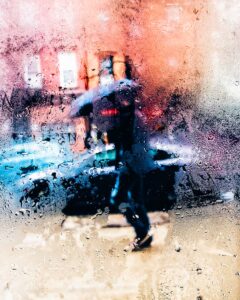In Rio de Janeiro, March is the rainiest month. It is a time when it rains so hard that roads become impassable, fields flood, hillsides slide, often destroying or damaging everything in their path. Life becomes difficult, even miserable for people. And for those people whose lives they built around rutted, dirt roads, living on or below unstable hills dotted with poorly constructed shacks made of corrugated iron and scrap wood and cinder block, the month of March is more than inconvenient–it’s deadly.
Brazil’s number one song, by the composer Antonio Carlos Jobim, memorializes his personal experience with the rains of March and the general challenges it brings to everyone. Frustrated,by getting stuck in the mud on his family ranch on his way to inspect a boundary wall, along a hillside, that was slipping–with the hill–down into the houses below. Frustrated with his own challenges, as he looked at the damage the sliding mud was causing to the simple homes of those below, he focused beyond his stuck car and struggling boundary wall. He realized that, for all the problems the “rains of march” were bringing to him, they are creating far greater threats to his simple, peasant neighbors farther down the hill.
The rains of March are about acknowledging how miserable, how threatening, and even how destructive those rains are. But, it is also about recognizing that it is those very rains that feed the next season’s crops, refill the reservoirs with water for drinking, washing and irrigation and wake the grasses necessary for grazing the animals that provide the meat, cheese, milk and other products people need to live.
No one has to be reminded that life comes with challenges and that they often come at the most inopportune times and in ways and in volumes that are often overwhelming. What Mr. Jobim reminds us is that the struggle and the challenges come WITH the blessings and the benefits. The March rains are destructive, but the March rains are also productive. They turn the roads to bogs and the hills to avalanches but they also restore the water supply, help grow the crops and create the grasses that feed the animals.
Among the lyrics of his song, he writes of this conflicting “with” from both the negative and positive sides when he says;
“… It is night, it is death, it’s a trap, it’s a gun.” And then, “… It’s a beam, it’s a hunch, it’s a hope. And the river bank talks of the waters of March. It’s the end of the strain, it’s the joy in your heart.
Life demands that we live with its harm and its blessing, with its hurt and its hope–with the fact that, “…it’s a night, it’s a death…” and “it’s the joy in your heart.”
We live in a world where good times come WITH bad times. What “The Waters of March” wants us to do is think about the pain WITH the pleasure and about the bad times WITH the good times and how, what seems like the end of one “world” can become the beginning of another “world” – what Jobim calls “… the end of the strain,… the joy in your heart.”
Lyrics to the song–Aguas De Marco by Antonio Carlos Jobim
A stick a stone, it’s the end of the road, it’s the rest of the stump, it’s a little alone it’s a sliver of glass, it is life, it’s the sun, it is night;it is death, it’s a trap, it’s a gun.
The oak when it blooms, a fox in the brush, the knot in the wood, the song of the thrush. the wood of the wind, a cliff, a fall, a scratch, a lump, it is nothing at all.
It’s the wind blowing free. it’s the end of a slope. it’s a beam, it’s a void, it’s a hunch, it’s a hope. and the riverbank talks of the water of march. it’s the end of the strain, it’s the joy in your heart.
The foot, the ground, the flesh, the bone, the beat of the road, a slingshot stone. a fish, a flash, a silvery glow, a fight, a bet, the range of the bow.
The bed of the well, the end of the line, the dismay in the face, it’s a loss, it’s a find. a spear, a spike, a point, a nail, a drip, a drop, the end of the tale.
A truckload of bricks in the soft morning light, the shot of a gun, in the dead of the night. a mile, a must, a thrust, a bump. it’s a girl, it’s a rhyme, it’s the cold, it’s the mumps.
The plan of the house, the body in bed, the car that got stuck, it’s the mud, it’s the mud. a float, a drift, a flight, a wing, a hawk, a quail, the promise of spring.
And the riverbanks talks of the waters of march. it’s the promise of life, it’s the joy in your heart.
A snake, a stick, it is john, it is joe, it’s a thorn in your hand, and a cut on your toe. a point, a grain, a bee, a bite, a blink, a buzzard, the sudden stroke of night. a pin, a needle, a sting, a pain, a snail, a riddle, a weep, a stain.
A pass in the mountains. a horse, a mule, in the distance, the shelves rode three shadows of blue. and the riverbanks talks of the waters of march. it’s the promise of life in your heart, in your heart.
A stick, a stone, the end of the load, the rest of the stump, a lonesome road. a sliver of glass, a life, the sun, a night, a death, the end of the run. and the riverbank talks of the waters of march. it’s the end of all strain it’s the joy in your heart.
(taken from “The Waters of March: The Story Behind the Song”, www.connectbrazil.com)



